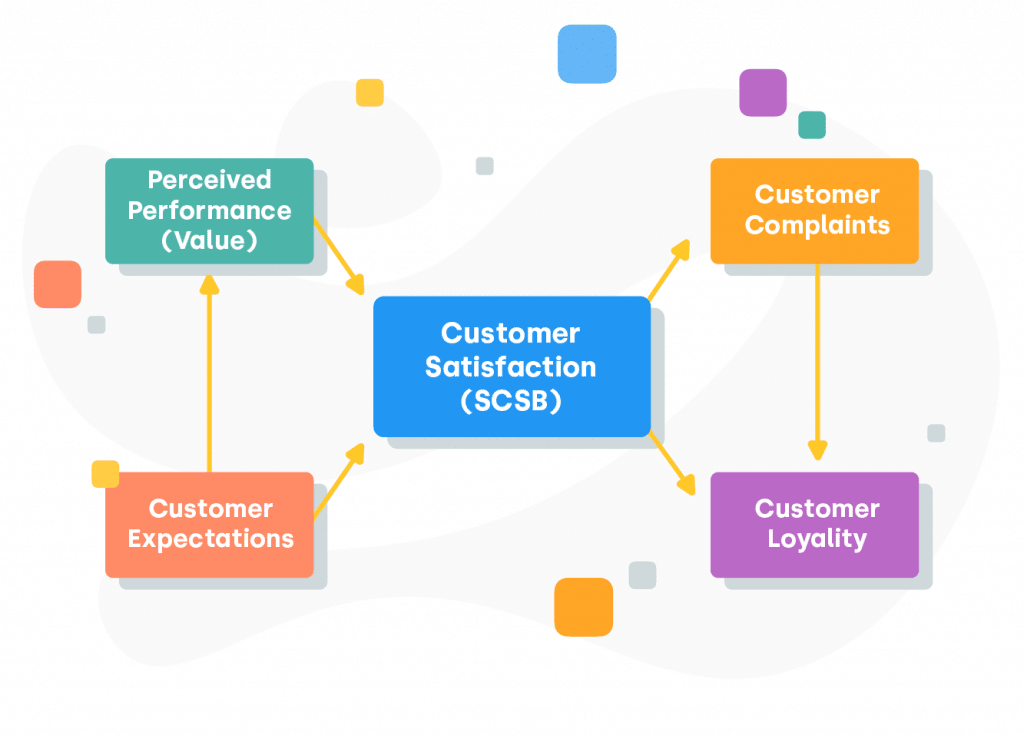7 Key Strategies for Improving Customer Service

Good customer service is essential to the long term health of successful businesses — without it, they’ll crumple under the weight of negative reviews and high customer churn. Luckily for you, we’ve compiled a list of 7 key strategies for improving customer service at your business. They’re practical, concise and, above all, actionable. Read on and enjoy!
Why is customer service important for your business?
You want the freight train that is your business to reach the far corners of the earth? It had better have a good engine. Excellent customer service is that engine — it’s what powers sustained success, year after year.
Done well, customer service has the potential to improve your company’s public image, which in turn creates word-of-mouth buzz . This sets you up with a competitive advantage and, ultimately, increases your profits. Think of it as a chain reaction, ignited by common courtesy and competence in your approach to customer service.
7 strategies to improve customer service
But how exactly do you improve the quality of your customer service? Let’s dive into some specific strategies for how you can get your customer service engine running on all cylinders.
1. Choose the right communication strategy
Before you can set about the work of building a house, you have to lay a foundation. When it comes to customer service, that foundation is called communication strategy.
It’s crucial that you devote time to developing a comprehensive communication strategy — something that can serve as a guidepost for your customer service agents in their frequent communications with customers. According to a study conducted by Microsoft, 58% of American consumers will switch service providers solely on account of poor customer service.
Ask yourself these three key questions:
- What is your company’s branding like?
- What is your brand voice?
- To what extent should that brand voice influence everyday communications with customers?
The safe route, of course, is to adhere to the strictures of absolute professionalism. Regardless of the type of business customer interacts with, they always expect courtesy and professionalism from the business’s customer service representatives.
We’d be willing to bet that there are some places, though, that a bit of your company’s unique flavor could be added into the mix. Consider what those might be, and seize the opportunity to stand out from your competitors.
How to retain customers and win their loyalty.
2. Build loyalty and create memorable customer experiences
Earning a customer’s loyalty can be a long, at times grueling process, but we’re here to tell you that it’s all worth it.
The effort customer service agents put into cultivating long-term relationships with customers will result in long-term stability for your business. And you can’t put a price on that.
Remember that there’s a silver lining to everything. Even seemingly embarrassing mistakes on the part of your customer service team have potential to be made into a positive.
Say for example an agent’s mistake results in a package being delivered to your customer several days late. When the customer calls your customer service team to complain about the delay, offer to compensate the customer for the price of the shipping in full. It’s an intuitive, easy-to-execute fix that will turn your customer’s negative feelings about the late package to positive ones about your business’s willingness to treat its clients with compassion.
Finally, be sure to implement a loyalty program as a means of rewarding customers that have shown — well, loyalty — to your business. A common example of this kind of program is a punch card: a wallet-sized card given to customers of coffee shops for them to keep track of the number of beverages they’ve purchased over time. Basically, “Buy 10 cups of coffee, get one free!” It’s a pretty simple concept and is easy for businesses of all types to pursue.
3. Use modern technology to your advantage and provide fast support
One of the most powerful tools in the modern call center agent’s toolkit is the effective use of automation. Knowing which processes to automate and which require a human touch is essential to the operation of first-class customer service teams. Take care to learn the distinction, and apply it to your everyday work.
Here are some examples of what you should and shouldn’t automate:
Frequently automated workflows:
- Authorization emails
Sending out boilerplate authorization emails is definitely something you should automate. For businesses that handle a substantial amount of email traffic from new trial sign-ups, anything else would be impractical. It isn’t reasonable to ask employees to respond to hundreds of emails a day, all on the same topic — it’d be very boring work.
- Follow-up SMS messages
These messages are typically short and direct. They don’t need to be tailored to specific customers or even to groups of the same type of customers. Drafting SMS messages once and then setting up a process where they’re automatically sent to customers when triggered by a trial sign-up, for example, saves everyone a lot of time.
- Dialing campaigns
Modern call center solutions like CloudTalk offer a bevy of Smart Dialing tools, including a Power Dialer, that can supercharge your sales efforts and result in more closed deals than you ever thought possible. How do they do it? Well, by allowing call center agents to speak with more people in less time.
Workflows where humans typically take the lead:
- Product demos
Most people don’t like to be lectured to at all, much less by a robot. Whenever your team conducts those all-important product demos, they should be carried out by a living, breathing sales representative.
- Live chats
It’s always better if on-site live chat conversations are handled by real-life customer service professionals. We know that it’s become relatively common practice to have AI handle these chats — especially during off-hours — but that fact has actually made it one of the key areas your company can stand out in customer service. So go the extra mile and have every last live chat customer handled by a human, even if it means hiring the extra staff necessary to run a 24/7 customer support operation. The alternative — having a significant number of customer chants handled by chatbots — can leave customers frustrated and less likely to recommend your product or service to their family or friends.
- Social media interaction
Social media marketing is all about putting a human face on your brand. It stands to reason, then, that most if not all of your company’s social media interactions (including those all-important replies) should be carried out by a real representative.
A study by Pega Academy found that only 27% of consumers feel that AI is capable of delivering the same or better quality customer service as humans.
We know AI communications tools are getting more and more advanced, but we recommend using them only if you don’t have room in your budget to hire enough customer service representatives.
4. Make an Irresistible Offer
The best customer service teams take every opportunity available to set themselves apart from the competition. This means leveraging every step of the customer journey to your advantage. How can you do it? There are several ways.
Your first responsibility is to make your initial offer to customers as attractive as possible. The possibility to “try before you buy” is certainly attractive to many people, so you’d do well to offer, and market, a generous trial period. For example, CloudTalk offers its customers a 14-day free trial with full access.
Discounts are another effective way to build excitement around your product or service. Experiment with offering seasonal or holiday discounts to your customers — it could lead to a significant boost in sales!

Don’t forget to pamper your clients as a thank you for their loyalty. Provide them with excellent customer service, exclusive access to new collections, gifts or discounts. Collaborate with print-on-demand services to create personalized merchandise as unique tokens of gratitude.Keep tabs on your competitors and always make sure you stay a step ahead in terms of the benefits you offer.
5. Personalize customer interactions
A surefire way to make your company’s customer service stand out is by offering highly personalized customer interactions. To this end, be sure to use your customers names when speaking with them, be proactive in attending to your customers’ needs and give your agents the leeway necessary to create truly unique and satisfying customer experiences.
More than that, though, you should apply the principles of customer segmentation to your customer service operation. Do the research necessary to understand who exactly your customers are and what motivates them. Look into purchase history, demographic information, geographic information and more in order to determine the kinds of customer service messaging most appropriate for a given customer segment. We won’t lie, conducting this sort of in-depth research into your customer base requires a significant investment of time and resources. But it really is worth it. In an interview for HBSWK, Harvard Business School professor Clayton Christensen explained that of the 30,000 new product launches that occur in a given year, 95% of them fail due to ineffective customer segmentation. Making the extra effort to conduct segmentation research and, by extension, effectively personalize your customer interactions can help your company be the exception to the rule.
Remember, satisfaction goes hand in hand with loyalty.

6. Request feedback from your customers
All good customer service teams ask their customers for feedback on a regular basis, and then use that information to implement meaningful improvements to their processes.
Efforts to gather feedback should be as far-reaching and inclusive as possible. You should value all of your customers’ feedback, regardless of how often they use your product or service.
Once you’ve gathered feedback, analyze it fully. The key here is to identify any problem areas that were lightning rods for negative feedback. Developing a strategy to improve those areas will be one of your most important tasks moving forward.
Now that the process of addressing your problem areas is underway, have your team craft thoughtful replies to all of the feedback messages you received, regardless of whether they were negative or positive. This is a truly crucial step, and the reason why is simple: your customers want to feel seen and heard. We all do, really — it’s human nature!
Lastly, be sure to share all of the feedback you’ve gathered with every single department at your company. Addressing areas of concern is one of those all-hands-on-deck kind of endeavors, so it’s best to have everyone on board and rowing in the same direction.
7. Set your team up for success
Your customers aren’t the only ones whose feedback you should be concerned about. Equally important is the feedback of your employees! They’re the ones whose actions ultimately determined the success or failure of your business, after all.
Ask your team: What do you need from management in order to do your job better?
Some agents will respond positively to this kind of question, as it gives them space to speak their mind. Others, though, will require a different approach.
If you’re finding it difficult to get your team to engage with broad, open-ended questions, ask more specific ones. For example: Have you noticed a significant impact on your conversion rate since we started using a smart dialer? This kind of question might be easier for an agent to answer, and will include more helpful information for the company, too.
Remember: communicating effectively with your employees on this score and others is of paramount importance.
The Bottom Line
Who is ultimately responsible for the crafting and maintenance of a company’s public image? It isn’t the CEO, the Brand Director or the PR specialist — it’s the too-often-underappreciated Customer Service Specialist.
Giving your customer service team the resources they need to succeed should be a priority for your business, and setting them up with CloudTalk is a great place to start.
CloudTalk is an all-in-one virtual phone software brimming with exciting, state-of-the-art features and endless integration possibilities. We could list them out in full, but why not experience them for yourself instead? CloudTalk’s 14-day free trial comes with unmitigated access to every unparalleled nook and award-winning cranny of our product. Ready to get started? We won’t stop you.
What did you find in this article?
How to improve relationships with your customers?
To improve relationships with customers, you should:
▪️ collect and use customer data,
▪️ choose the right communication strategy,
▪️ don’t let your clients forget you,
▪️ build loyalty,
▪️ use modern technology to your advantage,
▪️ personalize customer interactions and use custom greetings,
▪️ request feedback from your customers.
How to improve customer relationship management?
The ideal CRM customer service solution should improve productivity at an affordable rate while also creating a stronger relationship with customers. Here are 6 tips to improve your customer relationship management:
▪️ know you customer and use as much personalization as possible,
▪️ take care about data synchronization (relevant employees, calendars, meetings, sales pitch),
▪️ always update your information,
▪️ integrate your Customer Relationship Management System,
▪️ train your employees properly,
▪️ think of improvement and growth at all times.
How to improve CRM – Customer Relationship Management – in banking?
▪️ specify who your target audience is,
▪️ synchronize client data with your tools for more personalization,
▪️ ensure that customer data are save,
▪️ auto-calculate client fees,
▪️ personalized payment notifications,
▪️ keep your CRP updated,
▪️ create personalized marketing campaigns for banking products,
▪️ send the anticipated, personal and relevant messages about their accounts,
▪️ get clients data more secure,
▪️ auto calculate client fees,
▪️ personalized payment notifications,
▪️ personalized marketing campaigns for banking products,
▪️ send the anticipated, personal and relevant messages about their accounts.
Check our CRM software comparison and find out which CRM solution cloud be the best one for you.
























